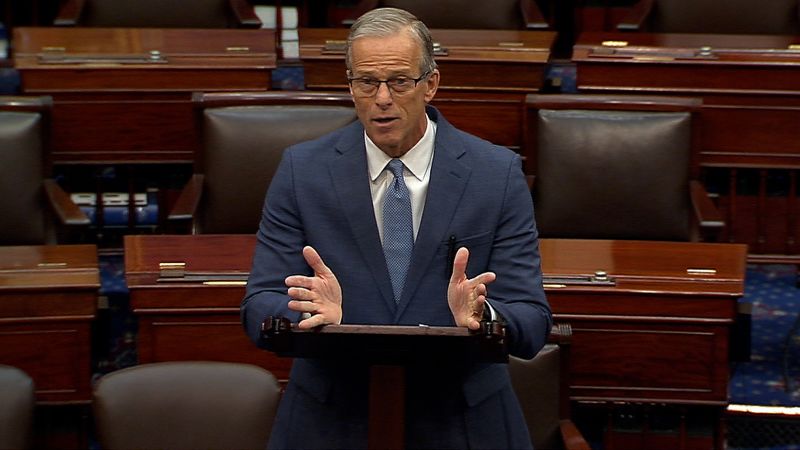The Senate has kicked off its marathon voting session onPresident Donald Trump’s sweepingdomestic policy billafter a weekend of negotiations and delays.
As Senate Majority Leader John Thune went to the floor Monday morning, he told reporters that “hopefully we’ll know soon enough” if Republicans’ have the votes to pass the bill. “This may take a little while,” he noted.
The vote-a-rama – an open-ended, hourslong series of votes on amendments, some political, some substantive – provides an opportunity for Republicans to make any eleventh-hour adjustments to the package and Democrats to push on GOP weak points in the bill and put their colleagues on the spot. Those politically tough votes are likely to provide fodder for campaign ads down the line.
Trump’s multitrillion-dollar bill would lower federal taxes and infuse more money into the Pentagon and border security agencies, while downsizing government safety-net programs including Medicaid.
Democrats are expected to zero in on Medicaid and other safety-net programs as they message against the president’s agenda. Monday’s exercise in stamina comes after Senate Democrats employed amajor delay tactic over the weekendthat forced clerks to spend more than a dozen hours reading aloud the entire bill.
Senators then debated the bill into the early hours Monday before adjourning and returning to the chamber at 9 a.m. ET to begin offering amendments.
Lawmakers are up against an extremely tight timeline to pass the legislation. The president has demanded Congress deliver the bill to his desk by the Fourth of July, but the measure must still go back to the House if it passes the Senate.
A number of Republicans are closely watching any changes made to Medicaid provisions in the bill.
The Senate version of the megabill would leave 11.8 million more people without health insurance in 2034, according to a Congressional Budget Office analysis released over the weekend. That’s more than the 10.9 million more people projected to be left uninsured by the House-passed version of the bill.
Both chambers are calling for historic spending cuts to Medicaid, which provides coverage to more than 71 million low-income Americans, including children, senior citizens, people with disabilities and other adults. The package would also enact changes to the Affordable Care Act that are projected to reduce enrollment in the landmark health reform law that Trump and Republicans have long sought to dismantle.
But the Senate version calls for even deeper cuts to the Medicaid, leading to the larger estimate.
It would slash federal support for Medicaid by $930 billion over a decade, Sen. Ron Wyden, the top Democrat on the Senate Finance Committee, said over the weekend, citing a CBO estimate. The House version is projected to reduce federal spending on the program by about $800 billion, according to the CBO.
Both chambers would require certain able-bodied adults ages 19-64 to work to maintain their Medicaid benefits for the first time in the program’s 60-year history. But the Senate version would impose the work requirement on parents of children ages 14 and older, while the House version would exempt parents of dependent children.
The Senate version would also lower the cap on the taxes that states levy on health care providers to help fund the program and increase reimbursement rates for providers. However, that provision would apply only to the 40 states and the District of Columbia that have expanded Medicaid to low-income adults. The House bill would put a moratorium on the states’ existing provider taxes.
The first vote taken by senators Monday dealt with a procedural argument over the so-called current policy baseline and how to calculate the costs of the bill. While it may seem dry, Republicans’ use of current policy baseline in their calculations will set a precedent allowing both parties to be much more generous when calculating costs of tax bills going forward.
Trump and some GOP leaders, including Senate Finance Chairman Mike Crapo, pushed the alternative “current policy baseline” scoring method, which seemingly greatly minimizes the deficit impact of the bill because it would not include the cost of extending the expiring 2017 tax provisions.
The CBO, however, calculated the cost of the bill using its traditional scoring method, known as “current law baseline,” which assumed the expiring provisions of the 2017 Trump tax cuts lapse as scheduled at the end of the year.
It projected the Senate’s bill would also costfar more than the House-approved bill, adding nearly $3.3 trillion to the deficit over a decade.
The Senate version is costlier in large part because it contains bigger tax cuts, while shrinking some of the spending cuts and revenue raisers, said Marc Goldwein, senior policy director at the Committee for a Responsible Federal Budget, a watchdog group.
For instance, the Senate bill would make permanent three corporate tax breaks that were part of the 2017 law and would lessen the cuts to the food stamp program.
“They expand the giveaways and shrink the takeaways,” Goldwein told CNN.
Using the current policy baseline, the Senate version would cost roughly $508 billion over the next decade, according to a separate CBO estimate released Saturday night.
